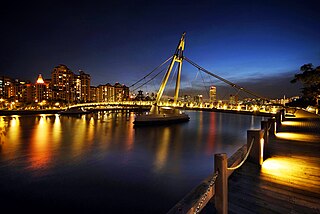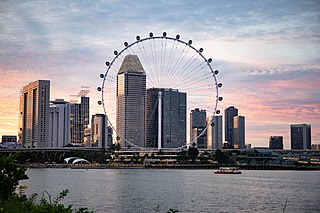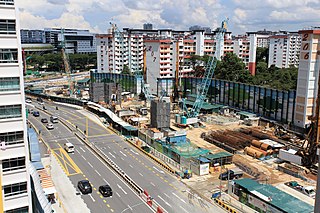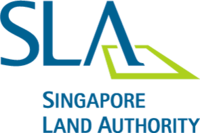
Transportation in Singapore is predominantly land-based, with a comprehensive network of roads making many parts of the city-state, including islands such as Sentosa and Jurong Island, accessible. The road network is complemented by a robust rail system consisting of the Mass Rapid Transit (MRT) and the Light Rail Transit (LRT), which cover the length and width of Singapore and serve a few neighbourhoods respectively. The main island of Singapore is also connected to other islands via ferryboat services. Furthermore, the city-state maintains strong international connections through two bridges linking it to Malaysia – the Causeway and the Second Link – and the Singapore Changi Airport, a major aviation hub in Asia.

The Land Transport Authority (LTA) is a statutory board under the Ministry of Transport of the Government of Singapore.

The expressways of Singapore are special roads that allow motorists to travel quickly from one urban area to another. Construction of the system was authorized when construction of the Pan Island Expressway began in 1962. All of them are dual carriageways with grade-separated access. They usually have three to four lanes in each direction, although there are two-lane carriageways at many expressway intersections and five-lane carriageways in some places. There are ten expressways. Studies about the feasibility of additional expressways are ongoing.

Kallang is a planning area and residential zone located in the Central Region of Singapore.

Bukit Timah, often abbreviated as Bt Timah, is a planning area and residential estate located in the westernmost part of the Central Region of Singapore. Bukit Timah lies roughly 10 kilometres (6.2 mi) from the Central Business District, bordering the Central Water Catchment to the north, Bukit Panjang to the northwest, Queenstown to the south, Tanglin to the southeast, Clementi to the southwest, Novena to the east and Bukit Batok to the west.

The Pan Island Expressway is the oldest and longest expressway in Singapore. It is also Singapore's longest road. The expressway runs from the East Coast Parkway near Changi Airport in the east to Tuas in the west and has a total length of 42.8 kilometres (26.6 mi).

The Bukit Timah Expressway (BKE) is a highway in Singapore that starts at the Pan Island Expressway in Bukit Timah and travels north to the Woodlands Checkpoint and the Johor–Singapore Causeway in Woodlands.

JTC Corporation (JTC), formerly the Jurong Town Corporation, is a statutory board under Singapore's Ministry of Trade and Industry that champions sustainable industrial development. It master-plans clean, green and smart estates to create attractive destinations for Singapore's talent and communities. The agency also drives innovations in the building and infrastructure sector.

This article shows the notable future developments in Singapore. Most of them are currently under construction with most to be completed within the next five years.

Tanglin is a planning area located within the Central Region of Singapore. Tanglin is located west of Newton, Orchard, River Valley and Singapore River, south of Novena, east of Bukit Timah, northeast of Queenstown and north of Bukit Merah.

King Albert Park MRT station is an underground Mass Rapid Transit (MRT) station on the Downtown Line (DTL) in Bukit Timah, Singapore. Located at the western end of Bukit Timah Road at the junction of Blackmore Drive, this station serves the private residential estates along the Bukit Timah corridor. Sites surrounding the station include Methodist Girls' School, Ngee Ann Polytechnic, and the preserved Bukit Timah Railway Station.

Beauty World MRT station is an underground Mass Rapid Transit (MRT) station on the Downtown Line (DTL) in Bukit Timah, Singapore. Located along Upper Bukit Timah Road, this station took its name from the historic Beauty World Market, a former amusement park and market that once stood in the vicinity. Beauty World station primarily serves the residential estates along Jalan Jurong Kechil and Toh Yi Drive, as well as Beauty World Centre, Beauty World Plaza, and Bukit Timah Shopping Centre. It is also within walking distances to Ngee Ann Polytechnic, Pei Hwa Presbyterian Primary School, Bukit Timah Market & Food Centre, Bukit Timah Community Club, Bukit Timah Tua Pek Kong Temple, and Bee Low See Temple.

Cashew MRT station is an underground Mass Rapid Transit (MRT) station on the Downtown line in Singapore, located between Upper Bukit Timah Road and Cashew Road. It is the nearest MRT station to the headquarters of the Ministry of Defence as well as the upcoming National Service (NS) Hub.

Hillview is located in Upper Bukit Timah, Northwest Singapore. The neighbourhood overlooks Bukit Timah Hill, hence its name.
CPG Corporation is an infrastructure, building management, and consultancy services company in the Asia Pacific.

The Cross Island Line (CRL) is a high capacity Mass Rapid Transit (MRT) line under development in Singapore. It will run in an east–west direction from Changi to Jurong Industrial Estate via Loyang, Pasir Ris, Hougang, Serangoon North, Ang Mo Kio, Sin Ming, Bukit Timah, Clementi and West Coast. From Pasir Ris, the line will branch off to Punggol. The 58-kilometre (36 mi) line will replace the East–West Line as the longest line on the MRT network upon its complete opening by the 2040s, serving about 27 stations.
Beauty World Market was an open-air market that was opened in July 1947 in Singapore. It was located at the junction of Upper Bukit Timah Road and Jalan Jurong Kechil. Just next to it was Beauty World Town, another shopping place was opened in 1962. It was located at the junction of Upper Bukit Timah Road and Chun Tin Road. Both shopping areas were completely demolished by 1984 due to frequent fire outbreaks. The original site of the market had since been occupied by two Parking lots and Beauty World MRT Station.

Changi East Depot is a future train depot in Changi East, Singapore. At 57 ha (140-acre), the at-grade depot will house 70 to 80 trains of the Cross Island line (CRL) fleet. The depot will be located along Aviation Park Road near the Changi Exhibition Centre. Other facilities of the depot include the Operations Control Centre (OCC) for the CRL. First announced in 2019, the depot is expected to be completed in 2030 along with the first stage of the CRL.

The Former Bukit Timah Fire Station (BTFS), located in Upper Bukit Timah Road, Singapore, was a fire station. It is planned to be redesigned into a community centre for nature. It is nearby the upcoming Hume MRT station. BTFS is also located nearby other heritage sites such as the Former Ford Factory, Bukit Timah Nature Reserve, and the Bukit Timah Memorial.

















